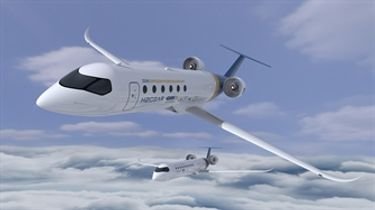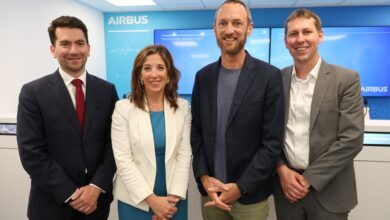easyJet and GKN Aerospace to work on hydrogen in aviation
The H2GEAR programme is supported by £27 million of ATI funding, matched by GKN Aerospace and its industrial partners.

easyJet is working with GKN Aerospace (a multi-technology tier 1 aerospace supplier) toward reducing carbon emissions in aviation through the adoption of zero carbon emission technologies.
easyJet will support the development of GKN Aerospace’s Hydrogen Combustion (H2JET) and Hydrogen Fuel Cell (H2GEAR) technology, including exploring the options for flight demonstration, as part of the airline’s ambition to de-carbonise aviation. Among others, easyJet will provide insights into operational requirements and economics.
H2GEAR is a GKN Aerospace led ground-breaking UK collaboration programme aiming to develop a liquid hydrogen propulsion system for sub-regional aircraft that could be scaled up to larger aircraft. Liquid hydrogen is being converted to electricity within a fuel cell system. This electricity efficiently powers the aircraft, eliminating carbon emissions and creating a new generation of clean air travel.
H2JET is a Swedish collaborative two-year programme led by GKN Aerospace to push the development of key subsystems for gas turbine-based hydrogen propulsion of medium-range civil aircraft.
Championing the development of a zero-carbon emission aircraft to de-carbonise aviation is a key focus for easyJet, and the airline is working with partners across the industry like GKN Aerospace, as well as Airbus, Rolls-Royce, Cranfield Aerospace Solutions and Wright Electric, to accelerate the development of zero carbon emission technologies and supporting infrastructure. The airline is optimistic that it could begin flying customers on planes powered by hydrogen-combustion, hydrogen-electric or a hybrid of both by the mid to late-2030s.
Beyond carbon, easyJet is focusing on reducing plastic – more than 36 million single-use plastic items were eliminated and reducing waste within its wider operations and supply chain. The airline also introduced new crew uniforms made from recycled plastic bottles. With 45 bottles in each uniform, this can prevent 2.7 million plastic bottles from ending up in landfill or in oceans over the next five years.
David Morgan, Director of Flight Operations, easyJet, said, “Cross-industry partnerships are key to developing these promising new technologies and we look forward to collaborating with GKN Aerospace to support bringing this technology to maturity as early as possible.”
Max Brown, VP Technology, GKN Aerospace, said, “At GKN Aerospace sustainability is at the heart of our business. Hydrogen-powered aircraft offer a clear route to keep the world connected, with dramatically cleaner skies.”
